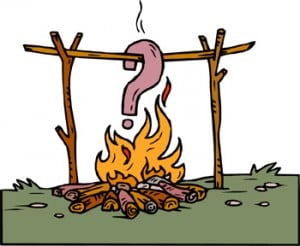Question of the Month: June

This month’s burning question came via a follower of @EnglishClub on Twitter. This friend used 3 pleases, so it must be an important question.
Question: “A bad habit is smoking cigarettes.” Is this sentence wrong?
Answer: Learners sometimes request a second opinion if they disagree with an Answer Key or a teacher’s mark on a test. In many cases the construction of the usage in question follows a simple rule. It looks right, and the learner cannot understand what the problem is. Sometimes the problem is related to ambiguity. This is just a fancy word that means that a word or phrase could have two or more meanings.
Here are some sentences that are ambiguous:
1) I feel like a pizza. (Do you feel like eating a pizza? Do you feel hot and greasy like a pizza?)
2) She was hit by a car crossing the road. (Was she crossing the road when she got hit by a car? Did a car crossing the road hit the girl?)
3) Lost Bicycle Found by House. (Did the house find the bicycle? Was the bicycle found near the house?)
Let’s look at the sentence from our twitter friend again:
“A bad habit is smoking cigarettes.” (How does a habit smoke cigarettes?)
If the reader ( or listener) thinks of “is smoking” as a present progressive verb form (rather than “smoking cigarettes” as a noun phrase-as intended) it seems the habit is doing the smoking. Even though the second possible meaning is illogical (a habit can’t smoke) it still sounds awkward. It might even make you form a funny picture in your head. Ambiguous headlines such as KIDS MAKE GOOD SNACKS often make people laugh. This is because our brains form a mental picture of the unintended meaning.
The meaning is clear in these revised versions:
“Smoking cigarettes is a bad habit.”
OR
“An example of a bad habit is smoking cigarettes.”
The main question still remains. Is it “wrong”? That depends on your definition of wrong. Yes, it could confuse someone. Yes, it could cause someone to ask you to repeat what you said. Will you still get your point across? Yes. Most likely.
Try to avoid ambiguity, but don’t beat yourself up over it. We all use poor construction from time to time. It is more important to avoid ambiguity in writing. Why? Because the writer is not always present to clarify the intended meaning. Reading your writing out loud is a good idea. You may detect your own vague and ambiguous sentences when you hear them. Rewrite the awkward sentence until it sounds perfectly clear.

Pronunciation Tip
am-bi-GU-ity
am-BIG-u-ous
WordChecker
Twitter (noun): a microblogging social network
ambiguous (adjective): unclear
awkward (adjective): not in good form; sounds a bit odd
clarify (verb): to make clear
get one’s point across (verb): to express something in a way so that another person can understand
beat yourself up over something (verb): to spend a lot of time worrying about a mistake
unintended (adjective): not meant
vague (adjective): unclear
Tara Benwell is a Canadian freelance writer and editor who specializes in materials and articles for the ELT industry.
© EnglishClub.com